A group of around 300 Eritrean refugees, who fled from the fighting in Tigray to the Ethiopian capital, Addis Ababa, have been put on busses and returned to the war zone.
They were held in the offices of the International Organization for Migration, which issued a strongly worded condemnation [below] condemning the use of their offices by the Ethiopian Government, without permission.
The refugees were forced onto 10 busses at gunpoint, and are being taken back to Tigray. They do not know their final destination, which may be the camps from which they fled.
Earlier today the UN High Commissioner for Refugees, Filippo Grandi, said this:
“I am deeply alarmed about the safety and well-being of Eritrean refugees in Ethiopia, who have been caught in the conflict in the Tigray region…
Over the last month we have received an overwhelming number of disturbing reports of Eritrean refugees in Tigray being killed, abducted and forcibly returned to Eritrea. If confirmed, these actions would constitute a major violation of international law.”
This picture shows Eritrean refugees walking away from the fighting in Tigray.
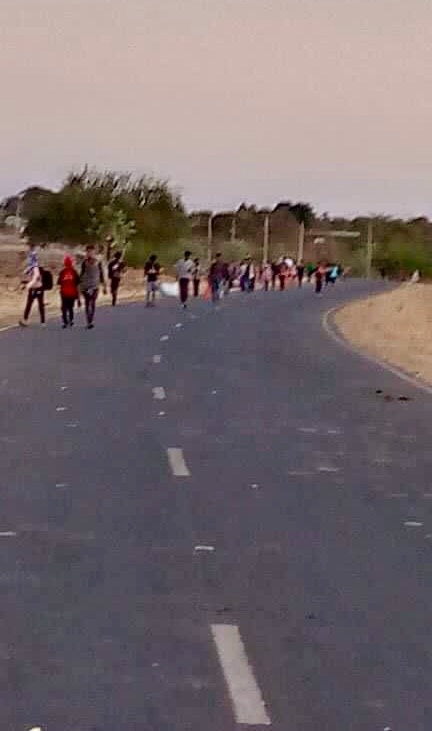
The photograph below shows the IOM office in which the refugees were held.
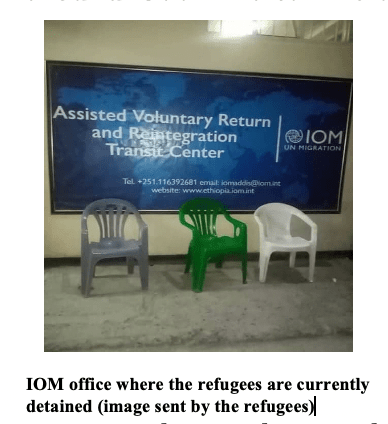
The photographs below show the refugees taking a rest break on the long journey back to Tigray, after being forced onto the busses by troops. The soldiers sent to guard them can be clearly seen.
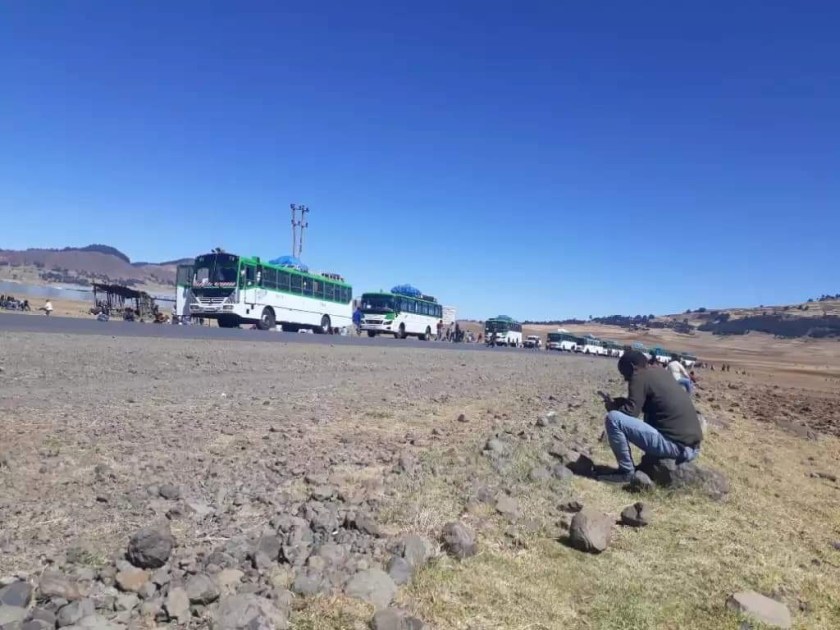
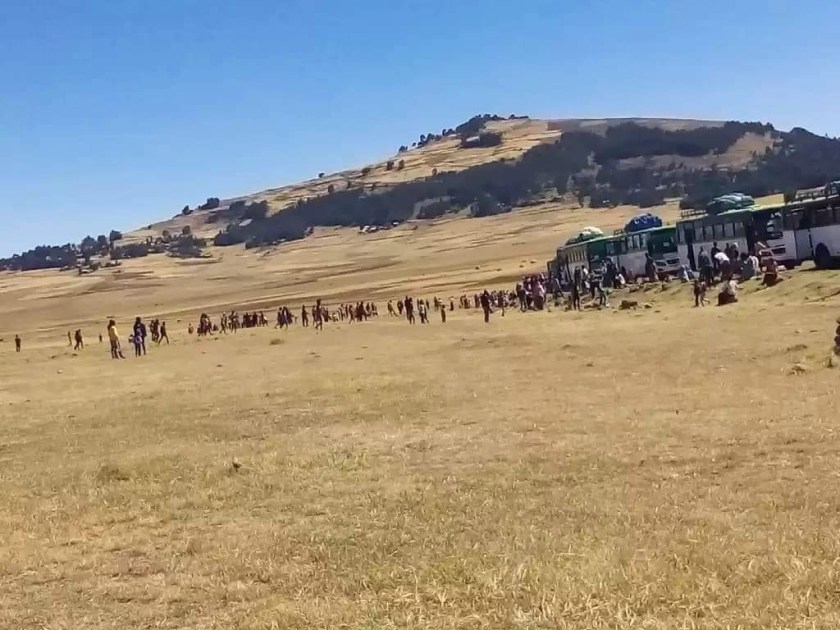
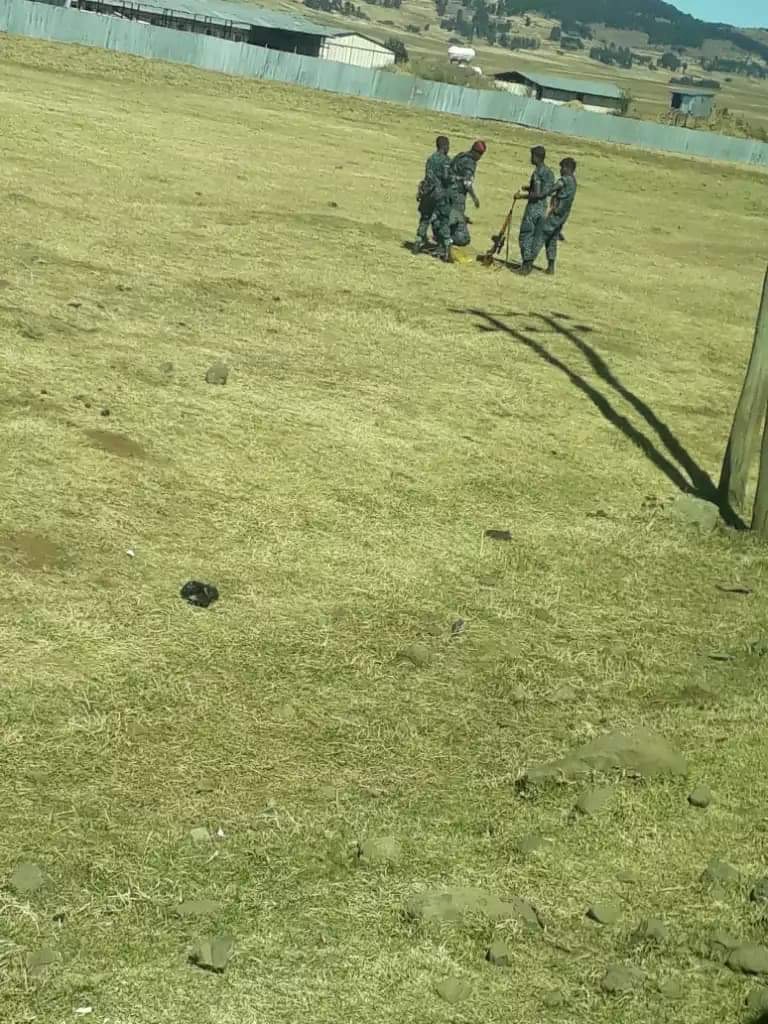
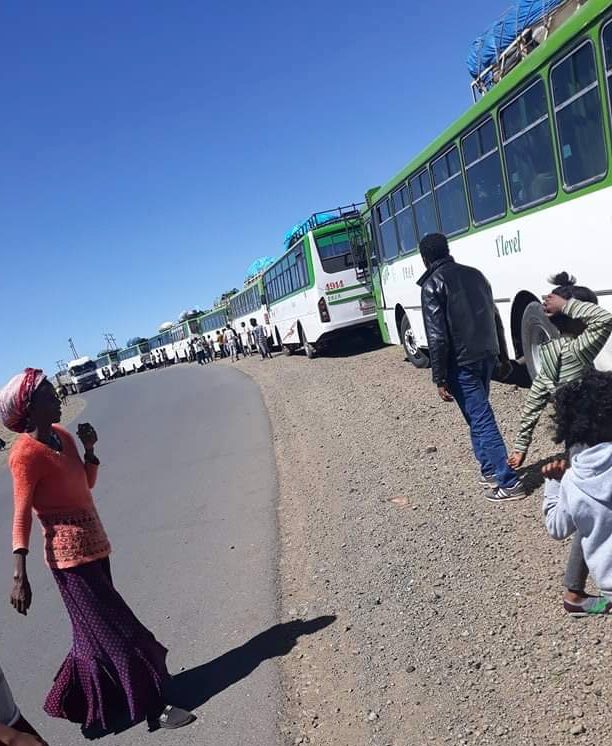
Statement from the IOM
Geneva – 11 December 2020
The International Organization for Migration (IOM) strongly refutes allegations that a group of Eritrean refugees are being held by IOM and being processed for forced return in one of its transit centres in the Ethiopian capital, Addis Ababa. The Organization equally rejects allegations that IOM buses have been used to transport the refugees to an unknown destination.
One of three IOM centres in Addis Ababa was taken over by the Ethiopian Government’s Agency for Refugee and Returnee Affairs (ARRA) on 3 December. IOM has had no management authority, oversight or involvement in any activities undertaken by the authorities in the centre since that time.
IOM does not under any circumstances conduct the forced return of migrants and refugees. The Organization’s approach to return assistance for migrants relies on the pillars of protection, human rights and voluntariness and in full respect of International Law.
The Organization is extremely concerned about these reports and appeals to States to ensure the protection of all civilians, including migrants and refugees. International Law and its Conventions, including the Principle of Non-Refoulement, must be respected at all times.
Statement attributable to the UN High Commissioner for Refugees Filippo Grandi on the situation in Ethiopia’s Tigray region
I am deeply alarmed about the safety and well-being of Eritrean refugees in Ethiopia, who have been caught in the conflict in the Tigray region. For over a month, UNHCR and humanitarian partners have had no access to the four Eritrean refugee camps inside Tigray, putting the safety and survival of the refugees at great risk.
The government of Ethiopia has said it will guarantee humanitarian access to the Tigray region for the UN and its partners. While the signed agreement is one first step, it needs to be implemented in a way that ensures safe and unhindered access for humanitarian workers in accordance with the principles of neutrality and impartiality. Such access is urgently needed so we can provide desperately needed assistance to refugees and other vulnerable populations.
Over the last month we have received an overwhelming number of disturbing reports of Eritrean refugees in Tigray being killed, abducted and forcibly returned to Eritrea. If confirmed, these actions would constitute a major violation of international law.
Ethiopia has a long-standing tradition of welcoming and hosting refugees who were forced to flee. I am strongly urging the government of Ethiopia to continue to uphold their responsibility towards refugees under international law, and to ensure the protection and safety of all refugees in the country.
To find safety and basic means of survival, many Eritrean refugees are fleeing the camps to locations both within Tigray and other regions of Ethiopia. We have met with some who managed to reach Addis Ababa. It is vital that Eritrean refugees be able to move to safe locations, and receive protection and assistance wherever possible, including outside of Tigray, given the traumatic events they report to have witnessed or survived. We remain committed to supporting and working with the Ethiopian government in this regard.
Meanwhile, the government and people of Sudan have generously welcomed the nearly 50,000 Ethiopian refugees who have sought safety in their country since the beginning of the conflict. UNHCR and partners have joined with the government to provide life-saving aid to people who are arriving exhausted, often following dangerous journeys to reach the border. I call on the international community to increase its support for the humanitarian response.
Ethiopian refugees in Sudan have expressed a desire to return home and rebuild their lives, but only when they can be assured of their safety and security. UNHCR stands ready to provide full support to the refugees at such time as they express a free and informed decision to return. Any returns must be safe, voluntary and dignified and take place in line with well-established principles on voluntary repatriation.
SIGNOR GRANDE,GRAZIE PER IL SUO IMPEGNO PER I MIGRANTI FORZATI IN MEZZO AI CONFLITTI, NOI CITTADINI DEL MONDO LA STIMIAMO MOLTO ,CORAGGIO ANDIAMO AVANTI CON LE BATTAGLIE PER GLI ULTIMI, GRAZIE DI CUORE
Can you share the coordiantes and roughly the time the images were taken? Thanks
Buongiorno sig, Grandi. Ammiro la vostra forza per aiutare, difendere, curare fare il necessario per i piu deboli e indifesi.
Grazie e Saluti
Stop the killer to Tigray and the refugee